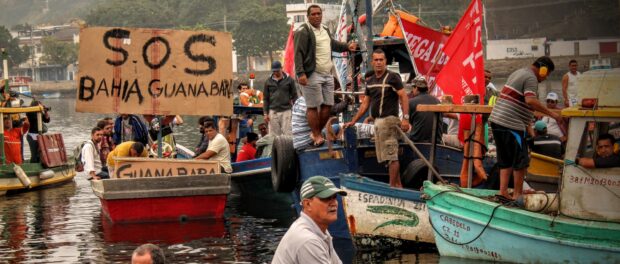
On Sunday, July 3, a coalition of fishermen’s organizations held a protest by boat in the Guanabara Bay demanding returns on a promise by the city of Rio to clean up 80% of the pollution in the Guanabara Bay before the 2016 Olympics. The organizations Baía Viva (Living Bay), Forum of Fisherman and Friends of the Sea and Tubiacanga Association of Fishermen joined forces to organize the demonstration, which had around 80 fisherman, community members and journalists in attendance.
The event began with the announcement of the movement’s agenda. The coalition demands compensation be paid to fishermen for the Petrobras leak of January 18, 2000, the creation of a fishing school and research center to be shared with universities on the small Ilha Seca island, and an end to the sewage leaks from the Gramacho and Itaóca garbage fills in Duque de Caxias and São Gonçalo that are devastating marine life.
The government’s failure to clean the bay before the Olympics is the latest in a series of unfulfilled commitments towards the Bay, beginning with the Guanabara Bay Remediation Program (PDBG) of 1991. A coalition of fishermen’s and environmental organizations, Baía Viva was founded to hold the government accountable to the PDBG, but they say 21 years later not one of the PDBG’s goals has been carried through. Baía Viva became active again last year, when the city’s latest broken promise to clean 80% of the Bay before the Olympics “provoked great indignation.”
For Sunday’s protest, participants took to fishing boats, sailing from the Zumbi beach on Ilha do Governador to Ilha Seca with signs reading “President of Petrobras pay the Guanabara fisherman NOW” and “The fisherman asks for help.” Environmentalist and Baía Viva founder Sérgio Ricardo highlighted the abandoned oil tanks on Ilha Seca that the coalition of fishermen’s organizations would like to convert into fish nurseries to repopulate the bay.
The fishermen funded the fuel for the boat protest themselves, which Ricardo describes as a “great effort.” He hopes the coalition will be able to find financial backing to pull off an even larger boat protest during the Olympics.
Fishermen and women described their experience of the devastation of the Guanabara Bay over the last several decades. Zaine Coutinho is known in the neighborhood as the first fisherwoman of Rio’s oldest artisanal fishing community. Recently, she saw an entire school of fish jump out of the water to die on the sand, something she says she had never seen before. “I reached into the water with my flip-flop and and it came up covered in oil. The fish couldn’t breathe,” she concluded. “There are mattresses, televisions and everything you can imagine in this water.”
“Long ago, we would catch tons of fish. Today, you cannot find even two kilos of fish here. We are forced to find other employment because we cannot sustain ourselves through fishing.” Coutinho would like to see Petrobras pay compensation to the fishing community and for the government to pay more attention to their needs.
“I wish we had more support, so that our fishing class doesn’t have to come to an end. Because there are schools that teach people how to fish. But how are you going to teach them if there’s nowhere for them to fish?”
According to Ricardo, only 12% of the Bay’s surface is free for fishing. The remainder has been turned into “fishing exclusion zones” by oil companies. “The fisherman who doesn’t fish within the right zone can be imprisoned as an environmental criminal, while the fossil fuel industry poses a much greater hazard to the environment.”
Ricardo claims that until the 1970s, the state of Rio de Janeiro was the second largest producer of fish in Brazil. “Today, Rio is behind states like Santa Catarina and Pará, because Rio has degraded its ecosystem.”
The protests are targeting the public. “There is a conflict of visions of what the future of the Guanabara Bay should be,” Ricardo stated. “Some would like to turn it over to the oil industry to be reindustrialized, while we defend the vision of a living bay which serves the economic and social development of Rio de Janeiro.”



